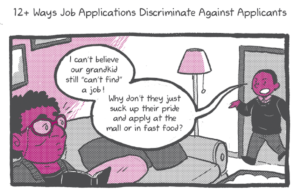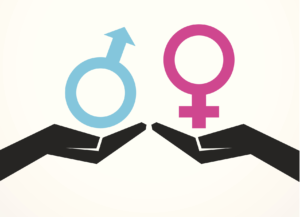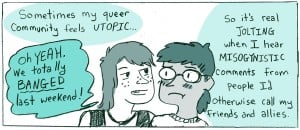
Shutterstock
Have you ever noticed how violent our language is? Even when we aren’t even talking about anything inherently violent itself?
We tell people to “go f*ck themselves” when we’re angry. We’ll “tear you a new one” when we’re insulting. We “force ourselves” to do a myriad of tasks, “hit on someone” when we flirt, and tell (mostly) women to “suck it” when their power is threatening to us.
That’s a lot of violence right there.
You’ve probably also noticed that that’s a lot of sexual violence.
This language might, on the surface, seem unimportant or coincidental, but as any linguist (or feminist) knows, our language shapes the way we see our world.
When we consider the fact that 1-in-3 women and 1-in-6 men will be victims of sexual violence, it’s not surprising that it is a massive focal point in our speech.
It’s not surprising that threatening sexual assault is the primary way that we engage in verbal warfare.
This language is so normalized, it’s probably part of your vocabulary, too. In fact, not using sexual violent language is almost impossible because of how ingrained it has become.
We don’t even realize what we are actually saying because we don’t question it.
If you’re reading this article, it’s likely that you want to end rape culture and sexual violence. You probably don’t want to be normalizing rape through your language.
So how can every one of us work to stop using language derived from sexual violation?
Stop Using It
This might seem like a pretty obvious answer, but really, we have to stop using it.
Every time we use this kind of language, we are a part of the problem.
We have to stop normalizing it in our own lives and call ourselves out when we use it. We have to hold ourselves accountable when we do.
A good way to stop a habit is first to understand it.
Try writing down or keeping tally for a few days every time you use one of these words or phrases.
Then, observe: What patterns do you see? Are you prone to using any specific phrases? Do you use them the most when you’re angry or upset? Do you use them more with people that you’re close to or strangers?
Once you understand your use of this language, you can begin to create an action plan to break this habit.
Notice certain people that tend to trigger this language? Revaluate your relationship, or at the very least, ask them to hold you accountable for what you say.
Do you tend to use this language when you’re angry or hurt? Next time you feel this way, pay attention.
Do you notice yourself leaving comments online filled with this language? Reconsider the way you interact on the web.
The point is to get out of old habits and into new ones.
It takes on average 66 days to make or break a habit. Be patient with yourself, but also stay on track.
Help Others Understand
Along with changing yourself, you also probably want to change other people’s use of sexually violent language, too. After all, isn’t that what activism is all about?
Just like with the previous step, forming an action plan is going to help you with this. Preparation does pay off.
Think about a time when someone said or did something that was problematic and you did nothing. How did it make you feel and why didn’t you intervene?
It’s likely that you were taken off guard and didn’t know how to react. I know I’ve been in plenty of situations like this myself, and I would spend days thinking of witty responses that I should have used.
Don’t get caught in this situation.
Prepare a response that you can use when you encounter this kind of language.
Even if you don’t feel comfortable speaking up, there are other ways to intervene.
You could pull the responsible person aside after a group conversation and explain to them why that kind of language makes you uncomfortable. You could even Facebook message with the person about it, if you don’t want to speak face-to-face.
If you want to avoid this altogether, maybe consider telling your close friends and/or family about your quest to eliminate sexually violent language from your speech and ask them not to use it in your presence.
There are a lot of ways that you can do this! Just make sure that your action plan is something you can actually carry out.
Like anything new, navigating this is going to take some practice.
It’s always a good idea to first start with people who are close to you. Maybe talk about it with your feminist friends about this first!
We all know approaching strangers is hard and violates a lot of social norms. That means we have to start where it’s easiest, or else this action may never come to fruition.
Think About Sex in New Ways
Have you ever noticed that a lot of the ways we talk about sex are dangerous?
The jury is definitely in on this one. There’s a very real connection between how we as a society discuss sexuality and the prevalence of sexual violence.
Collectively, we use the commodity model to understand sex.
This model comes from an economic model of scarcity, which advocates the idea that women’s worth is directly related to how much sex she’s had and that virginity is the most “valuable” status.
Men’s sexuality is, inversely, more valuable the more sex partner’s he’s had.
This is where the idea that men want sex and women want love, and that it’s women’s job to be the “gatekeepers” of sexuality.
When she has sex, her worth decreases. When he has sex, his worth increases.
This model is obviously sexist.
It also enforces stereotypes and defines sexuality based on propriety. This is precisely where “he’s a stud and she’s a slut” originates.
This is also where rape myths come into play.
Since women’s sexuality is based on a value judgment of her worth, and certain types of women are worth more than others, victims of rape are often blamed for the crimes committed against them.
Since men are encouraged to have many partners, and are thought to have uncontrollable “urges,” they are often given a free pass for the crimes that they commit.
This is also the basis of the cause of the erasure of people of other identities experiencing rape; victims come from all identities, although the majority of rapists are men.
And this leads us back to language: We threaten rape and sexual violation so often because of this stigma.
Language like “f*ck you” and “suck my d*ck” is rape-permitting and normalizes sexual violence. It creates a society that is full of rape myths and rape, even though we never talk about it. It creates rape culture.
This leads to the point that we need to have new models in which to think about sexuality. We cannot rely on the commodity model.
A great example of an alternative is The Standard of Enthusiastic Consent.
Basically, this philosophy says that safe, consensual sex is awesome (which it is). Only “yes means yes,” and your partner needs to be—well—enthusiastic about having sex with you.
Read more about this idea and train yourself to think about sexuality this way, instead of as a commodity.
Call yourself out when you use the double standard. Make sure your partners can and do say “yes” every single time. Support comprehensive sex education. Teach it to your children, too.
When we all decide to do away with the commodity model, we’ll do away with rape culture, too.
***
Doing away with the sexually violent language that we use is not going to be easy. It’s so ingrained that in most cases, we probably don’t even realize what we’re saying.
But it is possible. In fact, it’s even probable.
It all starts with you.
[do_widget id=’text-101′]
Erin McKelle is a Contributing Writer for Everyday Feminism. She’s an e-activist, video blogger, student, and non-profit advocate and has launched several projects including Fearless Feminism and Consent is Sexy. In her spare time, Erin enjoys reading, writing bad poetry, drawing, politics and reality TV. You can visit her site here find her blogging at Fearless Feminism, Facts About Feminism, andPeriod Positive. Follow her on Twitter @ErinMckelle and read her articles here.
Search our 3000+ articles!
Read our articles about:
Our online racial justice training
Used by hundreds of universities, non-profits, and businesses.
Click to learn more




















